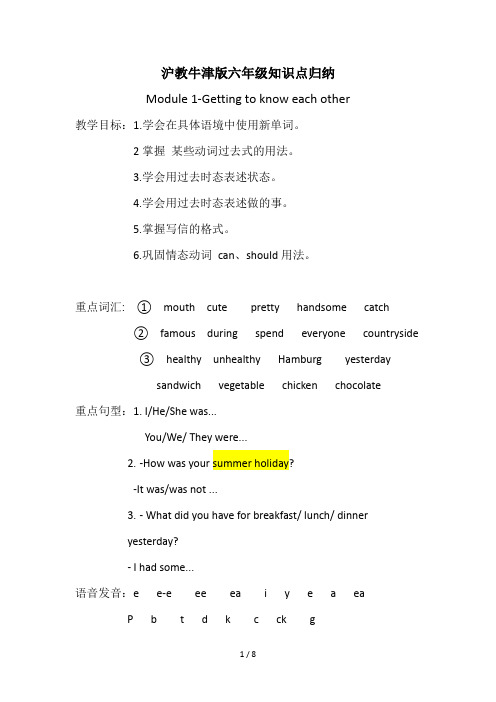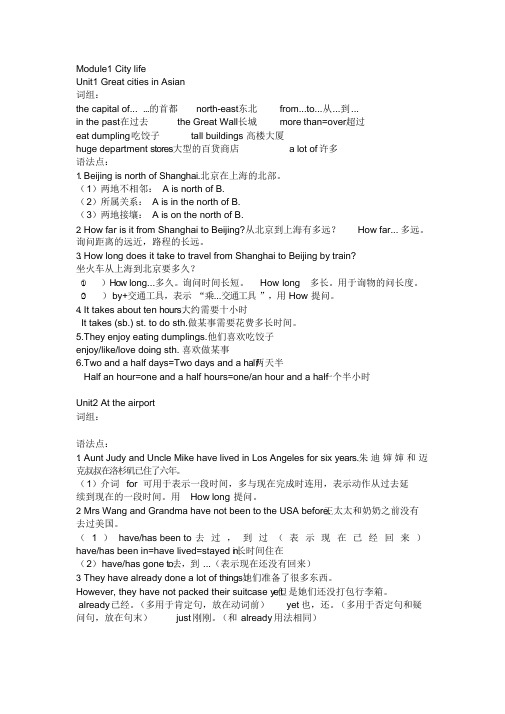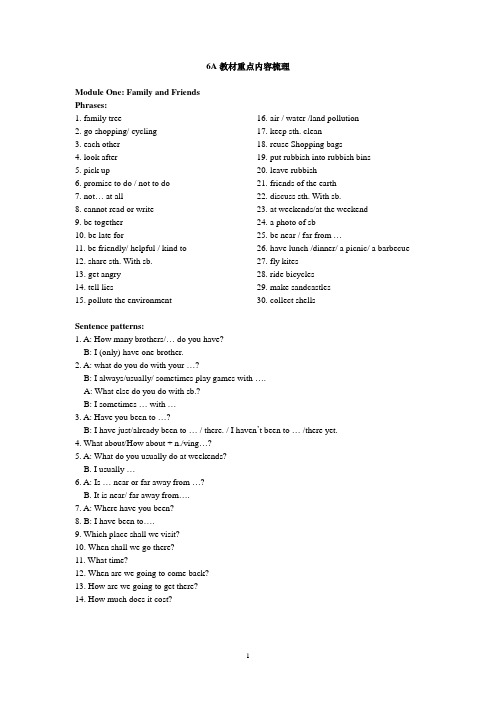上海牛津英语六年级预初英语知识点
牛津6A基础知识汇总

牛津6A基础知识汇总Unit 1单词1:always总是 2:question问题 3:ask问请求要求 4:mean意思是意指 5:must必须应当 6:should应当应该7:shouldn’t=should not不应该 8:pick拾采9:public公共的公众 10:sign标志告示牌子 11:cousin堂(表)兄弟姐妹 12:danger 危险 13:away(离)开 14:grass草地草 15:bird鸟 16:cage笼子 17:quiet安静的 18:noise噪声喧闹声 19:smoke吸烟20:litter乱丢杂物 21:park停放(汽车)22:touch触摸 23:suddenly突然(地) 24:something某事某物 25:note钞票纸币26:around周围在附近 27:nearby附近的 28:quickly快地29:keeper看守人 30:point 指 31:fine罚款短语1. four years old 四岁2. ask Ben some questions 问Ben 一些问题3. go in 进去4. stay away 远离5. keep off 远离6. make noise 发出(喧闹)的声音7. talk about 讨论 8. public signs 公共标志9. No smoking 禁止吸烟 10. No littering 禁止乱扔杂物11. No parking 禁止停车 12. Do not touch 禁止触摸13. Danger! 危险 14. No eating or drinking 禁止吃喝东西15. Keep off the grass 远离草地 16. take a walk 散步17. Be quiet 保持安静 18. be back home from the zoo 从动物园回家19. a ten-yuan note 一张十元纸币 20. say to 对……说21. pick up 拾起 22. come up 上来23. point to 指向 24.look around环顾四周25. fine ¥10 罚款10元 26. birds’cage鸟笼27.walk on the grass 在草地上行走 28.ask sb about sth 问某人关于某事29.no one nearby 附近没有人 30.give me ten yuan=give ten yuan to me 给我十元 31.shake one’s head 摇头句型1:He is asking Ben some questions. 他正在问本一些问题。
沪教牛津版六年级知识点归纳

沪教牛津版六年级知识点归纳Module 1-Getting to know each other教学目标:1.学会在具体语境中使用新单词。
2掌握某些动词过去式的用法。
3.学会用过去时态表述状态。
4.学会用过去时态表述做的事。
5.掌握写信的格式。
6.巩固情态动词can、should用法。
重点词汇: ①mouth cute pretty handsome catch②famous during spend everyone countryside③healthy unhealthy Hamburg yesterdaysandwich vegetable chicken chocolate重点句型:1. I/He/She was...You/We/ They were...2.-How was your summer holiday?-It was/was not ...3.- What did you have for breakfast/ lunch/ dinneryesterday?- I had some...语音发音:e e-e ee ea i y e a eaP b t d k c ck gModule 2-Relationship教学目标:1.学会在具体语境中使用新单词。
2掌握某些动词过去式的用法。
3.学会用一般过去时的疑问句。
4.巩固wh - questions 在过去语态中的用法。
5.掌握数词hundred,thousand的用法。
6.巩固Would like to...句型和There be ...句型。
重点词汇: ①neighbour son daughter noisy dig② thousand hundred wild way die learn send③e-friend country other hobby重点句型:1. - Did you +动词原形+过去时间?- Yes,I did./ No,I didn’t.2.There was a...in the past.There were many...in the past.3.-Would you like to ...-Yes,I’d like to./No, I wouldn’t.语音发音 a ar u o ue u-e oo uf v thModule 3-Out and about教学目标:1.学会在具体语境中使用新单词。
上海版牛津英语六年级(上、下)全重点知识点复习整理

上海版牛津英语六年级(上、下)全重点知识点复习整理上海牛津英语六年级上下册全知识点梳理频度副词always/sometimes/usually/never是频度副词,提问应该要用How often…?在句中的位置是:放在行为动词的前面,放在be动词的后面。
也可以说“行前系后”。
E.gShe is always kind.她总是很善良的。
She always helps other people.她总是帮助其他人。
不能出现这样的句子:She is always helps other people.(×)一句话中不能同时出现两个动词。
并且要注意主谓保持一致,尤其注意第三人称单数不可以忽略。
how often与how many timeshow often提问“频率次数+时间范围”how many times提问“频率次数”e.g.—How often do you exercise?—Twice a week.—How many times have you been there?—Twice.副词表示动作特征或性状特征。
一般用来形容或修饰除了名词和代词以外的词,主要修饰形容词、动词、其他副词和句子。
He looks very happy.(修饰描述词)The old lady is walking slowly now.(修饰动词)Luckily, he got the first prize.(修饰句子)描述词背面+ly构成副词:slow—slowlyslight—slightlyquick—quicklycareful—carefullyfierce—fiercelyimmediate—immediatelygentle—gentlylucky—luckilyhappy—happily介词What else do you do with your…?你和你的…还干什么?With是个介词,背面接人称代词时,要用宾格的形式。
沪教牛津版六年级(预初)下册英语知识点归纳

Module1 City lifeUnit1 Great cities in Asian词组:the capital of... ...的首都north-east东北from...to...从...到...in the past在过去the Great Wall长城more than=over超过eat dumpling 吃饺子tall buildings 高楼大厦huge department stores大型的百货商店 a lot of 许多语法点:1.Beijing is north of Shanghai.北京在上海的北部。
(1)两地不相邻: A is north of B.(2)所属关系:A is in the north of B.(3)两地接壤:A is on the north of B.2.How far is it from Shanghai to Beijing?从北京到上海有多远?How far... 多远。
询问距离的远近,路程的长远。
3.How long does it take to travel from Shanghai to Beijing by train?坐火车从上海到北京要多久?(1))How long...多久。
询问时间长短。
How long 多长。
用于询物的问长度。
(2))by+交通工具,表示“乘...交通工具”,用How 提问。
4.It takes about ten hours大.约需要十小时It takes (sb.) st. to do sth.做某事需要花费多长时间。
5.They enjoy eating dumplings.他们喜欢吃饺子enjoy/like/love doing sth. 喜欢做某事6.Two and a half days=Two days and a hal两f 天半Half an hour=one and a half hours=one/an hour and a ha一l f 个半小时Unit2 At the airport词组:语法点:1.Aunt Judy and Uncle Mike have lived in Los Angeles for six years.朱迪婶婶和迈克叔叔在洛杉矶已住了六年。
6A上海牛津英语六年级第一学期重点词组和句型

6A教材重点内容梳理Module One: Family and FriendsPhrases:1. family tree2. go shopping/ cycling3. each other4. look after5. pick up6. promise to do / not to do7. not… at all8. cannot read or write9. be together10. be late for11. be friendly/ helpful / kind to12. share sth. With sb.13. get angry14. tell lies15. pollute the environment 16. air / water /land pollution17. keep sth. clean18. reuse Shopping bags19. put rubbish into rubbish bins20. leave rubbish21. friends of the earth22. discuss sth. With sb.23. at weekends/at the weekend24. a photo of sb25. be near / far from …26. have lunch /dinner/ a picnic/ a barbecue27. fly kites28. ride bicycles29. make sandcastles30. collect shellsSentence patterns:1. A: How many brothers/… do you have?B: I (only) have one brother.2. A: what do you do with your …?B: I always/usually/ sometimes play games with ….A: What else do you do with sb.?B: I sometimes … with …3. A: Have you been to …?B: I have just/already been to … / there. / I haven’t been to … /there yet.4. What about/How about + n./ving…?5. A: What do you usually do at weekends?B. I usually …6. A: Is … near or far away from …?B. It is near/ far away from….7. A: Where have you been?8. B: I have been to….9. Which place shall we visit?10. When shall we go there?11. What time?12. When are we going to come back?13. How are we going to get there?14. How much does it cost?Module Two: Places and Activities Phrases:1. a bank clerk2. a shop assistant3. put out fires4. cook food5. make our city a safe place6. look at7. listen to8. arrive at9. have tea10. at the entrance11. on the ground/ first floor12. on the open day13. at half past eight in the morning14.First,../ Next,…/Then,…/After that,…/Finally, …15.take photos16. by ferry/ by underground/ on foot17. on the bus 18. go to school19. a lot of/ some/ a few20.live near/far away from school21.an advertisement board22. light rail23. a department store24. a housing estate25. a police station26. half an hour27. wait for28. walk on the grass29. keep quiet30. run across the road31. pick the flowers32. turn left/right33. on the right/left34. in the middle35. go upstairsSentence patterns:1.A: Would you like to be a/an…?B: Yes, I would.//No, I wouldn’t.A: Why?/Why not?B: I would /wouldn’t like to be a/an…because I…2.A: What would you like to be?B: I would like to be…3.A: Do you live near or far away from …?B: I live near/far away from ….A: How do you go to school?B: I go to school by…/on foot.A: How long does it take?B: It takes …4.A: How long does it take you to get to…?B: It takes me about…to get there.5.A: What does Simon see when he is walking to school?B: Simon sees ...when he is walking to school.6. What does this sign mean?7. We must not eat or drink./Don’t eat or drink.8. We must …9. A: Which escalator must we use?B: We must use the one in the middle.Module Three: Food and Drink phrases1. fried cabbage/chicken wings2. steamed prawns with garlic3. boiled eggs4. a shopping list5. at the vegetable stall6. in the frozen food section7. in the market/supermarket8. have a picnic9. a bottle of jam10. a packet of nuts11. a slice / slices of 12. an unhealthy diet13. do exercise14. live in the countryside15. stay with sb.16. plenty of / a lot of17. a little/ some18. my favourite breakfast19. too much spicy food20. eating habits21.the food pyramidSentence patterns:1.A: What would you like for dinner tonight?B: I’d like … for dinner.A: What kind of … would you like?Would you like … or …?B: I’d like…2.A: Have you bought any…?B: Yes, I’ve bought some…A: Where did you buy it/them?B: In the market, at the…stall/in the…section.A: How much was it/were they?B: It was /They were…yuan.3.A: Shall we buy some soft drinks?B: Ok./ That’s a good idea.4.Let’s buy some bread and a bottle of jam.Let’s go to the supermarket to buy some food and drink for the picnic.5.A: Would you like some…?B: No, thanks / yes, please6.A: Why do you like…?B: I like it/them because it’s/they’re sweet/delicious/tasty/spicy.7.A: Why not?B: I don’t want … because it is too ….8.A: May I have some …, please?B. Ok/ Sure/ All right/ Yes, you may. Here you are.//NO, you may not./ I’m afraid you can’t..9.A: How much sugar do we need every day?B: We need a little sugar every day.10.A: Which one was healthier/less healthy?B: …’s diet was healthier than/less healthy than/as healthy as/as unhealthy as …’s diet.11.How much … do we need?12.What do you usually have for breakfast/ lunch /dinner?13.A: What did you have for breakfast yesterday?。
2023年上海牛津英语六年级上下册全知识点梳理

上海牛津英语六年级上下册全知识点梳理频度副词always/sometimes/usually/never 是频度副词,提问应当要用How often??在句中的位置是:放在行为动词的前面,放在be动词的后面。
也可以说“行前系后”。
E.g She is always kind.她总是很善良的。
She always helps other people.她总是帮助其别人。
不能出现这样的句子:She is always helps other people.(×)一句话中不能同时出现两个动词。
并且要注意主谓保持一致,特别注意第三人称单数不可以忽略。
how often 与 how many timeshow often 提问“频率次数+时间范围”how many times 提问“频率次数”e.g. —How often do you exercise? —Twice a week.—How many times have you been there? —Twice.副词表达动作特性或性状特性。
一般用来形容或修饰除了名词和代词以外的词,重要修饰形容词、动词、其他副词和句子。
He looks very happy.(修饰形容词)The old lady is walking slowly now.(修饰动词)Luckily, he got the first prize.(修饰句子)形容词后面+ly构成副词:slow—slowly slight—slightly quick—quicklycareful—carefully fierce —fiercely immediate—immediatelygentle—gentlylucky—luckilyhappy—happily介词What else do you do with your??你和你的?还干什么?With是个介词,后面接人称代词时,要用宾格的形式。
牛津上海六年级英语知识点
牛津上海六年级英语知识点[简介]牛津上海六年级英语知识点是为了提供给六年级学生们一个系统的英语学习指导,帮助他们巩固和扩展在五年级已掌握的英语知识,并为进一步提高他们的英语能力打下基础。
本文将介绍牛津上海六年级英语常见知识点,包括英语语法、词汇和阅读理解等方面。
[一、英语语法]在六年级英语学习中,语法是一个关键的部分。
以下是一些常见的英语语法知识点。
1. 时态:牛津上海六年级英语课程注重学生对各种时态的理解和正确使用。
包括一般现在时、一般过去时、将来时等。
2. 名词的单复数:学生需要学会正确使用名词的单复数形式,并且能够通过上下文理解名词的意义。
3. 代词的主宾格:学生需要了解一些常见的代词,并学会在句子中正确使用代词的主宾格形式。
4. 形容词和副词的比较级和最高级:学生需要学习形容词和副词的比较级和最高级形式,并能够正确运用于句子中。
5. 动词的不定式和动名词:学生需要学会区分动词的不定式和动名词形式,并且能够根据上下文理解其使用方式。
[二、英语词汇]在六年级英语学习中,词汇的掌握是非常重要的。
以下是一些常见的英语词汇知识点。
1. 基础词汇:学生需要熟练掌握一些常见的英语单词,包括表示人物、动物、食物等方面的词汇。
2. 时钟时间:学生需要学会用英语表达时间,并且能够读懂时钟上的时间。
3. 季节和月份:学生需要学会用英语表达四季和十二个月份,并且能够通过上下文理解相关的词汇。
4. 数字和计数:学生需要学会用英语表达数字,并且能够正确计数。
5. 学科词汇:学生需要学会一些与学科相关的词汇,比如数学、科学、地理等。
[三、阅读理解]在六年级英语学习中,阅读理解是培养学生阅读能力和理解能力的重要环节。
以下是一些常见的阅读理解知识点。
1. 阅读短文:学生需要学会阅读简短的英语短文,并且能够通过阅读内容回答问题。
2. 理解问题:学生需要根据短文内容,理解问题的意思,并能够准确回答问题。
3. 推理判断:学生需要通过上下文理解短文中的隐含信息,并能够进行推理判断。
牛津英语六年级知识点总结
牛津英语六年级知识点总结牛津英语六年级是学生在英语学习中的重要阶段,他们需要掌握一系列的知识点,以便能够更好地理解和运用英语。
本文将对牛津英语六年级的知识点进行总结,帮助学生更好地复习和巩固所学内容。
1. 词汇与语法知识在牛津英语六年级中,学生需要进一步扩充词汇量,并灵活运用词汇。
此外,学生还需要掌握一些常见的语法知识。
1.1 词汇扩充学生需要学习更多的常用词汇,包括动词、名词、形容词等,并能够在日常生活或学习中正确使用这些词汇。
例如,学生应该熟悉常用动词的各种时态和语态,能够正确运用不同的词汇来描述人物、物品以及各种活动。
1.2 句型与语法在六年级,学生需要理解并运用一些复杂的句型和语法结构。
例如,学生应该能够正确使用比较级和最高级来进行描述,掌握被动语态的用法,理解并运用条件句和虚拟语气等。
2. 阅读理解阅读理解是英语学习中非常重要的一部分,通过阅读能够提高学生的语言理解能力和阅读能力。
在六年级,学生需要阅读各种不同题材的文章,并能够正确理解并回答相关问题。
2.1 理解词义学生需要通过上下文理解词义,掌握一些常见的词汇搭配和短语用法,从而能够准确理解文章中出现的生词和难词。
2.2 主旨大意学生需要能够通过阅读文章的段落和标题,理解文章的主旨大意,并能够回答与文章内容相关的问题。
3. 听力技巧在牛津英语六年级的学习中,学生需要提高自己的听力技巧,能够准确理解并回答听力材料中的问题。
3.1 听懂对话学生需要通过听力材料,能够听懂日常生活中的对话,包括人物的名字、地点、时间以及具体的活动内容。
3.2 提取关键信息学生需要通过听力材料,能够准确提取关键信息,包括人物的观点、意见、喜好等,从而能够回答与听力材料相关的问题。
4. 口语表达牛津英语六年级的学习也涉及到口语表达,学生需要能够流利地用英语进行口头交流,以及正确运用一些常用口语表达。
4.1 日常交流学生需要通过与他人的交流,能够用英语进行日常生活中的问候、介绍、询问信息等。
六年级英语全部知识点牛津
六年级英语全部知识点牛津一、语法知识点1. 时态六年级英语学习要求掌握一般现在时、一般过去时、一般将来时、现在进行时、过去进行时、现在完成时等时态。
2. 名词六年级学习要求掌握可数名词和不可数名词的区别,以及复数形式的转换规则。
3. 代词学生需要掌握人称代词、物主代词、反身代词等的使用方法和变化。
4. 形容词和副词掌握形容词和副词的用法,以及形容词和副词的比较级和最高级形式。
5. 动词学生需要掌握动词的一般现在时、一般过去时和将来时的使用方法,并能正确运用各种动词时态进行句子的变换。
6. 介词掌握常见的介词的用法,如in、on、at等,并了解其在表示时间和地点方面的用法。
7. 冠词了解冠词的用法和区别,如定冠词the和不定冠词a/an的使用规则。
8. 从句学会主从复合句的构成和使用,如宾语从句、定语从句、状语从句等。
9. 疑问句学会构造和使用疑问句,包括一般疑问句、特殊疑问句和选择疑问句等。
二、词汇知识点1. 常用词汇学生需要掌握一定量的常用单词,包括名词、动词、形容词、副词等。
2. 短语和固定搭配学生需要掌握一些常见的短语和固定搭配,如take care of、look forward to等。
3. 同义词和反义词了解一些常见单词的同义词和反义词,并能正确运用。
4. 各类词汇扩展学生需要通过阅读和积累来扩展自己的词汇量,提高词汇应用能力。
三、阅读理解知识点1. 理解文章主旨学生需要通过阅读短文,能够准确理解文章的主旨和大意。
2. 掌握阅读策略学生需要学会运用一些阅读策略,如找关键词、扫读和略读等方法,提高阅读理解能力。
3. 回答问题学生需要通过阅读短文,能够根据问题准确回答问题,理解文章细节。
4. 掌握阅读技巧学生需要通过阅读理解练习,掌握一些阅读技巧,如推理、判断等,提高阅读能力。
四、听力知识点1. 听懂简短对话学生需要能够听懂简短对话,理解对话中的信息和意思。
2. 听懂口头说明学生需要能够听懂老师或同学口头的说明,理解说明的内容和要求。
牛津上海版六年级知识点总结精编
牛津上海版六年级知识点精编有范围the other 两者中的一个(n)one…the otherThe others 一个范围里的一部分(n) some…the others(a)other+ n (people)(n) others other people, some…some…others…Another +数词+名词eg: another five chairslive 长期居住stay 短期居住before 用在现在完成式ago 用在一般过去式shall not = shan’tLet’s… , shall we?Let sb. doeg: Let him go homea bit 一点点, a litter, much+ 比较级别比校级eg: a bit faster 一点点快a bit 形容词eg: a bit beautiful 一点点漂亮动词eg: a bit run 跑一点点‘d had better (not) doWould like sb(not) to do/would not like to doOne thousand five hundred and forty-nine中间不加”and” 中间要加”and”cost-cost-cost sth. cost sb. some money 某物使某人付了一些钱pay-paid-paid pay some money for sth. 为了某物付了一些钱spend-spent-spent sb. spend some money (in) doing sth.on sth.take-took-takenget to (必须加介词)reach + 名词,不用加介词arrive at + 小地方eg: arrive at the schoolin + 大地主eg: arrive in Beijingget therehere 中间不用加”to”take sb./sth. to sp. 带某人/物去某地, 从说话的地主带到别处.Bring sb./sth. to sp. 带某人/物来某地, 离说话的人近, 从别处带到说话的地主方.more than = overbe……to, eg: be kind to / be unkind to / be friendly tosave…from 从……救出……一般将来式……if + 一般现在式. eg: I will go to the park if it dosen’t rain tomorrow.情态动词…… eg: I must go to school if it doesn’t rain tomorrow.slowly, quickly. 都是两音节的, 但它们比较级都是加”more”的.eg: more slowly, ……come back = return / go backcome back from sp.Write sth. to sb. = write sb. sthHave a wonderful time = have a good time = enjoy oneselfBe interested in sth.doing sth.用现在完成式How long……?talk with/to sb. about sth. 可以互换healthy(a.) unhealthy (a.)healthier than less healthy thanexciting 形容物eg: The book is exciting.Excited 形容人eg: Kitty is excited.visit n. a visit to sp. eg: a visit to Beijing.v. visit sp. eg: visit Beijing.leave sth. sp. (in my home) (leave-left-left) leave:遗忘,遗留forget sth. (forget-forgot-forgotten)forget to do 忘记没有做的事(别人提醒)doing 忘记已做过的事remember to do 记住没有做的事doing 记住已做过的事lovely a.n. + ly a.a.+ ly ad. eg: careful (a.)+ ly carefully(ad.)keep……as…… 保留……作为…… (keep-kept-kept)prefer doing sth1 to doing sth2prefer sth1 to sth2eg: I prefer apples to bananas.更喜欢也喜欢(prefer-preferred)keep 延续性动词eg: I have kept this book for a week.borrow 瞬间动词eg: I borrowed this book a week ago.give sb. sth. give sth. to sb. (give-gave-given)danger (n)dangerous (a) safe (a)However,…………, however, ………… , but ……=Though …… , …… 这两个不能同时出现在同一个句子中.eg: You got up early this morning, but you were late for school.eg: Though you got up early this morning, you were late for school.this morning 用一般过去式this afternoon 用一般将来式I am ill. (be动词+表语, ill 只能做表语)sick 定语/表语eg: sick animals; He is sick; (sick 也可以表示晕船) in + 一段时间, 必须用将来式. eg: in twenty minutes, in a week……too……to…… 太……以至于不能……eg: too expensive for me to buy. 对于我来说太贵了以至于不能买.keep sb./sth. + a.(如:warm / safe)help sb. (not) to dohelp sb. dolet sb. doon one’s way to sp.on one’s way home by the way : 顺便miss-missed-missed , lose-lost-lost , (顺便学一下loose-loosed-loosed , 释放) missing = lost用”ing”形式做adj. 用动词过去分词做adj.cross (v) …… + (adv) safely, carefullyacross (prep) walk across the roadsheep, fish, deer, Chinese, Japanese 单复数同形take careful(a) care(n) of 形容词放在名词之前take care of …carefully 副词放在最后,修饰动词carefully take care of… 副词也可放在动词前Where……? At…… “where”提问, 回答一定要有介词.May I speak to……? 想要叫某人来接电话.Who is that? / Is that ……? 问对方是谁.This is …… 介绍自己be made of / from +原材料in…… + 地点for example + 完整的句子such as + 单词,词组raise money 收集钱款raise dogs 养狗six millionmillions of + 可数名词复数(注意million的变化)most of students are…… half of the apple isthe water is…… apples arethe USA, the UK…… 国家缩写前要加”the”There are also people come from…… (一句句子中谓语只能有一个)There are also people who comes from…… (宾语从句)There are also people coming from……用形容词The British(总称,复数) 不能用”How many the British……? ×British people 形容词+ 名词Britishers (Englishman, Englishwoman)listen (to music) (listen:不及物动词) look at sth. (look: 不及物动词) hear music(sth.) (hear: 及物动词) see sth. (see: 及物动词) make sb. +a+v make a living 谋生In another country = in other countriessend sb. sth = send sth. to sb. send-sent-sentbe done 被动语态We call the boy Tom.The boy is called Tom by us.fill sth1 with sth2 (eg: fill the bag with books 用书来填充书包)be filled withbe full of = be crowded withkeep your eyes closedopenWhat does the word mean?What’s the meaning of this word?How nice(a) the park is!How fast(ad) Peter is running!be on (电影)上映Which film is on in the cinema now?be located = lie 位于lie-lay-lain 躺着, 说谎, 位于lay-laid-laid 放置, 铺设, 产卵protect……from…… 保护……免受…… write to sb. 写给某人further 抽象, further study 进一步深造farther 具体the same +n + as be different fromas +a. + ashave sth. to do 有某事要做, make great progress 取得进步long before 很久以前before long 不久What’s the matter(n) with you?Wrong(a)enjoy doing sth. = like doing sth.asleep 熟睡sleepy 疲倦的提问时,”When” 在前, “Where”在后回答时,”Where” 在前, “When”在后like……better…… prefer = like betterprefer……to…… prefer preferredfavourite…… prefer……to…… = like better……than……hope to dothat + sb. + 将来式(in the) north-east of……In the east of China 在中国的东部(在范围之内)Beijing is north of Shanghai 北京在上海的北部(在范围之外)go, come, leave 用现在进行式表示一般将来式on + 具体某一天eg: on the morning of Oct. 25thin + 月份/年份at + 时间enjoylike/ love to do sth.finish +doing sth.practiceIt is important for sb. to do sth.形式主语主语Sth. be important to sb.主语You were watching TV at eight last night.过去具体时间点用过去进行式two-thirds 前面是基数词, 后面是序数词, 如果基数词是≥2的,那么序数词要加”s”invite sb. to do sth. 邀请某人做某事What (job) do you do?问职业Wath’s your job?What are you?different from the same……as……difference between可数,不可数都可以the same……as 与……相同move……to…… 把……搬到……protect……from 保护……使免受……keep……from 保护……免遭……prevent……from 阻住……使免受……It’s time for doing sth.sth.It’s time to do sth.life lives 生命(可数)life 生活(不可数)wish……I will 我希望……wish sb. sth. 这个愿望是奢望make sb. dosb. / sth. + adj. eg: make our city beautiful.Would you please……Would rather (not)…… + doHad better (not)……Would you like + to doat ChristmasChristmas Eveon New year’s eve on time 准时+……day (具体的日子) in time 及时both……and……are= not only……but also 主语+ 谓语(就近原则)eg: Not only they but also Mary likes to go to school.复数就近原则,likes跟Mary变化be afraid = be frightenedget on/ off a busget into /out off a car/taxitake care of = look after = care for名词动词Immediately = at oncePerhaps = possibly = maybe(adv.)two days later 用在过去式after two daysin two days 用在将来式towards 更强调方向性toquite a few 许多many / mucha lot of / lots ofplenty ofShall we……?=Why not……?= why don’t we……?Knowledge, traffic, information, news, weather, furniture, work, 不可数名词buy sth. from sp./sb.buy sth. for sb./sth.bring sth.to sb. 带来(离说话人近)take sb./sth. to sp./sb. 带去(离说话人远)keep one’s eyes openclosed (动词过去分词做形容词)I go to school every day 名词短语,多用作时间状语。
- 1、下载文档前请自行甄别文档内容的完整性,平台不提供额外的编辑、内容补充、找答案等附加服务。
- 2、"仅部分预览"的文档,不可在线预览部分如存在完整性等问题,可反馈申请退款(可完整预览的文档不适用该条件!)。
- 3、如文档侵犯您的权益,请联系客服反馈,我们会尽快为您处理(人工客服工作时间:9:00-18:30)。
Module 1 Family and Friends
Unit 1 Family and Relatives
一、词汇及短语
1.relative n.亲戚,亲属(是可数名词,复数形式直接-s)
e.g. Mary is my close relative. 玛丽是我的近亲。
2.family n.家;家庭;家人(意为“家人”“家庭成员”时,谓语动词用复数;意为
“家庭”时,表示一个整体,谓语动词用单数)
e.g. This is my family. 这是我的家。
They are my family. 他们是我的家人。
常见短语:family tree家谱
3.granddaughter n.(外)孙女
4.grandson n.孙子;外孙
5.only adv.仅仅
6.member n.成员;会员
7.shop n.商店 v.购物(shopped,shopping)
常见短语:bookshop(bookstore)书店 shopping bag购物袋 shopping centre购物中心
go shopping=do some shopping去购物
8.else adv.别的,其他的
e.g. –What else do you want? 你还要别的什么吗?
-Nothing else, thank you. 不要别的了,谢谢。
注意else与other的区别,两者意思相近,但是else一般用来修饰不定代词、疑问代词、疑问副词,并后置。
而other只能修饰名词,且放在名词前。
someone else别人 nothing else 没有其他的 who else还有谁 what else还要什么
other people其他人 other things其他东西 other places其他地方
9.badminton n.羽毛球
10.cycle n.自行车 v.骑自行车
常见短语:go to school by cycle=cycle to school骑自行车去学校
go cycling去骑自行车
go jogging慢跑
11.birthday card生日贺卡
12.watch TV/watch a film(movie)看电影/电视
13.a blank piece of paper一张白纸
14.a photo of一张…的照片
二、句子
1.Alice has got a lot of presents and birthday cards from her family and relatives.
爱丽丝从她的家人和亲戚那里收到了许多礼物和生日贺卡。
(“get…from…”从…得到…)
2.Make a birthday card for one of your family members or relatives.为你的家人
或亲戚中的一员做一张生日贺卡。
(“one of…”…其中之一)
3.I only have one aunt.我只有一个阿姨。
4.She is the only girl in her family.她是家里唯一的女孩。
5.Only three students failed in the PE examination.只有三个同学没通过体育测试。
6.Only you can help me.只有你能帮我了。
三、语法
1.How many/much…do you have?你有多少…?
e.g. How many books do you have? 你有多少本书?
How much bread do you have? 你有多少面包?
2.What (else) do you do with…?你(还)和你的…一起做什么?
3.频度副词
always总是;永远 usually通常 often经常 sometimes有时
(1)注意频度副词在句子中的位置:
频度副词在句子中习惯上位于be动词、助动词之后,行为动词之前。
e.g. She is always late for school. 她上学总是迟到。
He usually goes to bed at about 12. 他通常十二点睡觉。
often可以放在句中,也可放在句尾,一般不放句首。
e.g. We have been there quite often. 我们经常到那儿去。
My grandma often goes for a walk after dinner. 我奶奶经常在晚饭后散步。
sometimes较特殊,既可以放在be动词、助动词之后,行为动词之前,也可以放在句首,还可以放在句中、句尾。
e.g. I sometimes think that it is a great mistake. 我有时想这事一个大错误。
Sometimes I help my mother in the house. 有时候我帮助妈妈做家务。
(2)对一件事发生的频率进行提问时,要用How often…?
e.g. How often do you go to the cinema? 你们多长时间看一次电影?。
